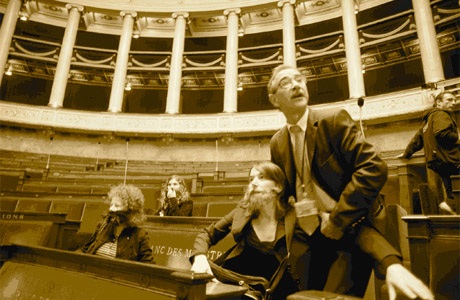Spurred on by the Dominique Strauss-Kahn case, our collective is taking direct action to challenge sexism in French society
For many, the words "French" and "feminism" sound like a hilarious oxymoron. But on 23 May, a few days after Dominique Strauss-Kahn’s arrest in New York, thousands of women gathered in Paris to protest against the sexism expressed by (mostly male) politicians and men of influence in the French media. Women of all ages gathered, overcoming the differences that often opposed generations in the French feminist movement. The scale of the rally was a reflection not only of how big the DSK scandal was but of the force with which French feminism has, over the past few years, risen from the ashes.
La Barbe ("The Beard" – which also means "enough !" or "boring !" in old French slang) is emblematic of this resurgence. Members of the collective appear regularly on the front pages, sporting their fake beards. With 74 actions under its belt since its inception in March 2008, and with offspring organisations in Nantes, Toulouse, Niort and even Mexico (where they’re called Las Bigotonas – The Great Moustaches) La Barbe’s MO is to gatecrash high-level political, economic and cultural events every two weeks. Women wearing fake beards take the stage and stand silently in front of the array of individuals in suits and ties to underscore the pervasive over-representation of men in places where important decisions are made. They hand out an humorous flyers to the public, congratulating men on successfully keeping "harpies and gossips" out of their ranks and maintaining all power within their wonderfully firm male grasp.
On National French Heritage Day, when millions of French spill into the streets to visit monuments and sites of national pride, six women wearing fake beards quietly took the podium at the centre of the senate’s chamber, surrounded by busts of the great men of French history. Beneath the gold-leafed dome, one of them read aloud from a text eulogising France’s founding fathers, ending with a rousing, "Long live the France of our fathers, long live La Barbe !" before they were dragged away by senate police. Confused by the activists’ gender, the policemen then stumbled over both male and female pronouns. Creating confusion is an art at La Barbe.
Media-savvy from the start, La Barbe has thus cajoled the media into reporting on male supremacy. The bearded activists have also been known to directly target the same media whose attention they solicit : le Nouvel Observateur, Liberation, RTL and RMC Radio, Radio France, Europe 1, Telerama, France 2 and Telefoot 1 have all been victims of a La Barbe action.
In 2009, La Barbe erupted on the set of Ce soir ou jamais, a popular talkshow on France 3, a public television channel. Six male philosophers were invited to dissect the true meaning of happiness. A dozen members of La Barbe sneaked onto the set and encircled the panel while two of them took turns reading from an 1863 poem by Eugene Fromentin : "Happiness is composed of three things on earth which are : sunshine, a woman, and a horse !" They were forcibly ejected by a stunned host, but the message was widely heard : better to have whiskers if you want to be invited.
Over the past month, La Barbe’s actions included crashing Carrefour’s annual board of trustees meeting for the second time, and invading a high-level summit on fishing policy with a slogan that said "Men and men first".
In May, La Barbe teamed up with more mainstream groups such as Osez le Feminisme (Dare Feminism) to demonstrate and circulate a petition entitled "ils se lachent, elles trinquent" (men let loose, women pay) that brought thousands of women of all ages into the streets. The defence of DSK by the French establishment was heard by feminists as an expression of white male power in French society.
